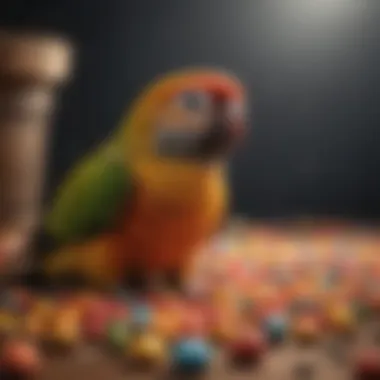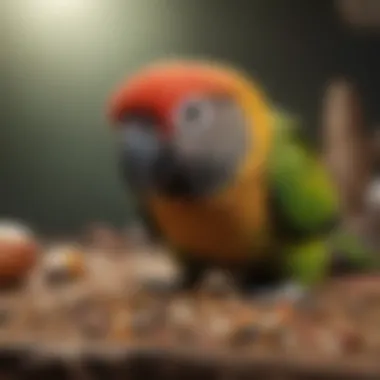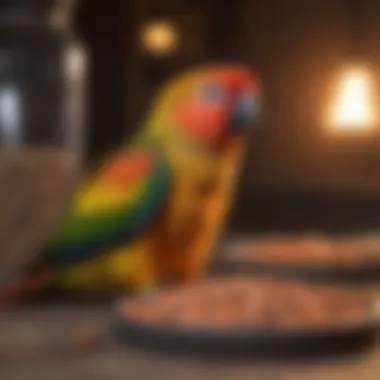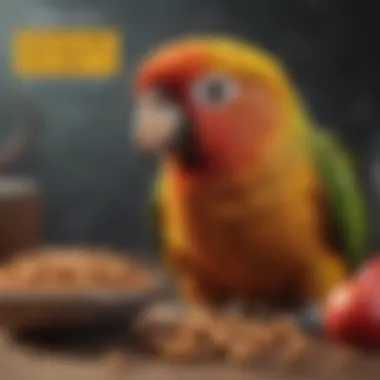Optimal Nutrition for Conures: Top Pellet Choices


Intro
When it comes to nurturing conures, understanding their unique nutritional requirements is crucial. Many owners often find themselves navigating the maze of options available for these colorful, social birds. From the perfect blend of vitamins to the right texture of pellets, the choices are endless. Nutrition isn’t just a side note; it’s the foundation that supports a conure's lively demeanor and overall health.
This guide will help demystify some key points about selecting the best pellets for your feathery friends. We will crawl through a myriad of aspects, from recognizing the specific dietary needs of different conure species to evaluating popular brands on the market. The goal here is clarity, providing you with the knowledge to make informed decisions for your pet's wellbeing. Arming yourself with accurate information will lead not only to healthier diets but also happier, livelier companions.
Curious about which pellets to choose or how to discern the chatter around them? We will also tackle common myths and offer strategies for complementary foods, rounding out a wholesome diet for your conures. Stick around as we unpack the essentials, guiding you step-by-step toward optimal nutrition.
Understanding Conures' Nutritional Needs
Understanding the nutritional needs of conures is fundamental not only for their health but also for their overall happiness. Just like us, birds require a varied and balanced diet to thrive. This section will break down the essentials of avian nutrition, the role of pellets in a conure's diet, and the vitamins and minerals essential for their well-being. Grasping these elements will inform pet owners on how to make the most suitable choices for their feathered friends, ensuring they receive the best possible care.
Essentials of Avian Nutrition
Avian nutrition is a science that goes beyond mere birdseed. Conures, with their vibrant colors and lively personalities, need a nutrient-dense diet. A balanced diet for conures typically includes grains, seeds, fruits, and vegetables. These components provide vital nutrients that keep them fit and energetic.
Each food group contributes something important. Grains deliver carbohydrates for energy, while seeds contain healthy fats and proteins necessary for muscle maintenance and overall bodily functions. Fruits and vegetables, on the other hand, are crucial for hydration and offer a barrage of vitamins important for immunity and metabolic processes.
Focusing solely on one type of food, like seeds, can lead to deficiencies. For instance, too many sunflower seeds can contribute to obesity and fatty liver disease in birds.
Role of Pellets in a Conure's Diet
Pellets serve as a cornerstone in a well-rounded diet for conures. Unlike seeds that may lack complete nutrition, premium pellets are formulated to include all necessary vitamins and minerals. This makes them an excellent primary food source.
Why should you consider including pellets?
- Consistency: With pellets, ensuring balanced nutrition becomes simpler. Unlike wild birds, pets have restricted diets, and pellets provide the necessary education in nutrition without fuss.
- Reduction of Selective Eating: Birds can be picky. They may choose their favorite seeds over healthier options, leading to nutritional gaps. Pellets help mitigate this issue, forcing a more varied intake.
- Convenience: They are easy to store and serve, making feeding less time-consuming for pet owners. No washing or cutting of fruits and vegetables required, just open the bag and pour.
Vitamins and Minerals: What to Consider
When selecting pellets or any food for your conure, it's vital to check the vitamins and minerals included in the diet. Here are some key nutrients to keep an eye on:
- Vitamin A: Important for healthy skin and feathers.
- Calcium: Essential for bone health and vital during breeding among females.
- Vitamin D3: Helps in calcium absorption, crucial for overall bird well-being.
- Omega Fatty Acids: Promote healthy skin and feathers and support heart health.
It's also worth noting that some conures may need different nutritional balances based on their age, health, and activity level. For instance, an active young conure may have different requirements compared to a senior bird.
In summary, understanding what contributes to optimal nutrition is key to ensuring your conure lives a vibrant and healthy life. Prioritize a diverse diet that focuses on high-quality pellets, and enrich it with fruits, vegetables, and, when necessary, supplements to foster their well-being.
Factors to Consider When Choosing Pellets
When it comes to carving out the best dietary path for your conure, the selection of pellets plays a pivotal role. A conure's diet must not just fill its belly but also provide all the essential nutrients necessary for vibrant health and spirited antics. Hence, several factors should be on every conure owner's mind as they sift through the myriad of options available in the market. This section aims to paint a clear picture of these considerations, allowing you to make informed choices that will keep your feathered friend in tip-top shape.
Quality of Ingredients
First and foremost, the quality of ingredients in the pellets is non-negotiable. Just as humans benefit from whole, unprocessed foods, conures thrive on high-quality ingredients. Look for pellets that boast ingredients like whole grains, fresh fruits, and vegetables. Avoid those filled with artificial additives and fillers that do little for your bird's health. Ingredients should ideally be non-GMO, as this can minimize chemical exposure that might affect your pet adversely.
Often, looking at the first few items on an ingredient list lays the groundwork. Your pellets should ideally include natural sources of protein, carbohydrates, fats, and fiber. Brands that specify the source of protein, such as chicken or soy, can also be preferable. While it might be tempting to opt for the cheapest option, making a wise investment in premium quality pellets can save you from potential health problems later on.
Size and Shape Preferences for Conures
Another vital consideration is the size and shape preferences for your conure. Just like you wouldn't expect a toddler to eat a steak in one bite, your bird may struggle with pellets that are too large. Ideal pellets should be bite-sized, allowing your conure to pick them up comfortably with its beak. Look for pellets shaped in a way that encourages natural foraging behavior, as conures are instinctively inclined to explore their food. Pellets that are too hard or too big can lead to frustration or, worse yet, injury.
In general, most conure owners find that small, round pellets work well, but the best shape can often depend on the individual bird's preference. By observing your conure, you can determine if it has a particular liking for certain shapes or sizes, allowing for a more tailored approach to its dietary needs.


Availability of Flavor Varieties
Additionally, the availability of flavor varieties can significantly impact your conure's willingness to eat pellets. Birds are inquisitive creatures, often requiring stimulation through diverse tastes and textures. A monotonous diet can bore a conure, leading them to avoid their pellets altogether. Brands that offer various flavors like fruity, nutty, or even herbal can be a boon in keeping meals exciting.
Consider offering a rotation of flavors instead of sticking to one type. You might notice that specific flavors resonate well with your conure's palate while others might seem completely disregarded. Don't hesitate to mix it up to figure out which flavors your bird prefers most!
"Remember, a diverse diet not only satisfies your conure's taste buds but also assures they get a range of nutrients."
In summary, when choosing pellets for your conure, focusing on high-quality ingredients, appropriate sizes and shapes, and a variety of flavors will dramatically enhance their dietary experience. Paying close attention to these factors not only ensures that your conure remains healthy but also keeps meal times lively and engaging.
Top Pellets for Conures: A Comprehensive Review
Selecting the right pellets for your conure is like finding the perfect dance partner; it needs to be a good fit for a harmonious relationship. Pellets are a vital component of a balanced diet, ensuring that your bird receives essential nutrients while simplifying the feeding process. This section dives deep into the most reputable pellet brands available today, examining their specific benefits, nutritional compositions, and ingredients. With an increasing number of options flooding the market, understanding each product’s value is crucial for conure owners committed to optimal nutrition.
Brand One: Detailed Analysis
Brand One has carved a niche for itself by prioritizing high-quality ingredients sourced from trusted suppliers. Its formula is rich in vitamins and minerals aimed at supporting the overall health of conures. Notably, this brand incorporates natural flavorings that cater to the birds' preferences, making it highly palatable.
Here are some key features:
- Natural Ingredients: This brand avoids artificial additives, focusing on wholesome grains and seeds.
- Balanced Nutritional Profile: Contains a good balance of macronutrients, essential fats, and fiber, which aids in digestion.
- Enriched with Omega-3: Beneficial for feather health, keeping your conure's plumage vibrant.
To sum it up, Brand One shines for its commitment to avian health.
Brand Two: Nutritional Breakdown
Brand Two is another heavyweight in the pelleted nutrition game. It prides itself on transparency, offering detailed information about its formulations. One of the hallmarks of this brand is its specialized blend of nutrients tailored specifically for conures, acknowledging their unique dietary needs.
The nutritional breakdown includes:
- High Protein Content: Sueful for muscle development and energy, especially for active birds.
- Fortified with Vitamins: Essential vitamins A, D3, and E enhance immunity and overall vitality.
- Promotes Healthy Digestion: Innovative fiber sources support digestive health and nutrient absorption.
With these facets, Brand Two provides a reliable dietary option for conscientious bird owners.
Brand Three: User Reviews and Recommendations
When it comes to Brand Three, user reviews play a pivotal role in assessing its quality. Many customers commend this brand not just for its nutritional composition, but also for the noticeable improvements in their birds' behavior and energy levels post-switch.
Some highlighted points include:
- Bird Enthusiast Approved: Many owners report their conures enjoying the taste, which often leads to less waste.
- Visible Health Improvements: Birds show more vibrant colors and improved feather quality.
- Ease of Transition: Owners have found that their conures adjust smoothly from seed diets to this pellet formulation.
Brand Three appears to strike a chord with both birds and their keepers alike.
Emerging Brands to Watch
In the ever-evolving world of avian nutrition, new brands are continually popping up with fresh perspectives and innovative formulations. Here are a few emerging brands that are garnering attention among conure owners:
- Brand Four: Focuses on organic ingredients and sustainable sourcing, appealing particularly to eco-conscious consumers.
- Brand Five: Targets niche markets, like birds with special dietary needs, offering specialized formulas tailored to different health issues.
- Brand Six: Prioritizes taste by incorporating unique flavor combinations, promising to entice even the pickiest of eaters.
These brands are making waves, and they might just be the next big thing in conure nutrition. Keeping an eye on these newcomers could yield exciting options for your pet's diet.
Complementary Foods and Treats for Conures


Complementary foods and treats play a pivotal role in the well-rounded nutrition of conures, supplementing their primary pellet diet. These additions do not just spice up their meals; they provide essential nutrients that pelleted food might lack. While pellets offer a balanced base, incorporating treats and fresh foods allows you to meet the diverse nutritional needs of your feathered friends.
Enticing your conure with variety can also stimulate their natural foraging instincts, enhancing their overall well-being. Birds in the wild consume a range of foods, from fruits to nuts, making it essential for pet owners to recreate this diversity in a home setting. Offering a balanced approach not only keeps your parrot happy but can also promote better health in the long run.
Fruits and Vegetables: Best Options
When it comes to fruits and vegetables, the options are bountiful. Providing fresh produce is crucial as it offers vitamins, minerals, and moisture that pellets simply cannot supply. Here are some favorites that many conures enjoy:
- Bell Peppers: Colorful, crunchy, and high in vitamin C, bell peppers can be an appealing addition to your conure's diet.
- Dark Leafy Greens: Spinach, kale, and arugula are packed with nutrients. They should be fresh and washed thoroughly to remove any pesticides.
- Carrots: Rich in beta-carotene, carrots can be shredded and offered raw.
- Berries: Blueberries, strawberries, and raspberries are not only nutritious but also sweet and enticing for your bird.
However, not all fruits are safe. Avocado must be avoided at all costs as it’s toxic to birds. A good rule of thumb is to wash all produce and cut them into bite-sized pieces to make it easier for your conure to eat.
Seeds: Should They Be Included?
Seeds often receive mixed responses among avian experts. On one hand, seeds are a natural food source for many birds, and they can be enjoyed as an occasional treat. On the other hand, they are high in fat and can lead to obesity if given in excess.
Here are a few considerations to keep in mind regarding seeds:
- Moderation is Key: Offering seeds as a treat rather than a staple helps maintain a balanced diet.
- Variety Matters: If you choose to add seeds, mix them with pellets and treats to ensure they receive the right nutrients without over-indulging.
- High Quality: Opt for seed mixes that are organic and free from additives. Just like with pellets, quality matters.
In this context, seeds should be viewed as a complement rather than the main course.
Encouraging Diverse Diets
Creating a diverse diet for your conure is essential for their overall health and happiness. While pellets form a solid foundation, variety keeps birds mentally stimulated and physically healthy. Here’s how to encourage different dietary habits:
- Introduce New Foods Gradually: Birds can be hesitant to try new things. Introduce one new food at a time alongside their regular offerings.
- Use Positive Reinforcement: If your conure tries a new treat, applaud them. This can encourage further exploration of different food options.
- Rotate Offerings: Regularly change the fruits and veggies available. Doing so keeps the diet exciting and ensures a range of nutrients.
Common Misconceptions about Pellets and Conures
Understanding the common misconceptions surrounding pellets and their role in a conure's diet is essential for ensuring the well-being of these colorful birds. Many pet owners find themselves entangled in misunderstandings that can influence their feeding practices and, consequently, the health of their feathered friends. By addressing these misconceptions, we can illuminate the path toward informed decisions that support a balanced and nutritious diet for conures.
Pellets vs. Seed Diets
One of the most prevalent beliefs is that seeds, often seen as a traditional favorite, should be the primary food source for conures. In reality, while seeds do hold some nutritional value, they can also be high in fat and low in essential vitamins and minerals. A diet overly reliant on seeds may lead to health issues like obesity and vitamin deficiencies.
Pellets are designed specifically to offer a balanced nutritional profile that addresses the dietary needs of conures. Unlike seeds, pellets contain a mixture of grains, vegetables, and essential nutrients, ensuring that each bite delivers the right elements for a happy and thriving bird. The importance of this shift cannot be overstated:
- Nutritional Balance: Pellets provide a more equitable distribution of vitamins and minerals.
- Weight Management: With lower fat content, pellets can help maintain a healthy weight.
- Prevents Selective Eating: Unlike seeds, pellets discourage birds from picking only their favorites.
"Think of pellets as a complete meal, while seeds are like snacks that can lead to poor dietary habits."
The Myth of One-Size-Fits-All
Another common misconception is that there exists a single pellet type or brand that suits all conures equally. Just as people have different dietary needs, so do birds. Factors such as age, size, and individual health conditions can influence what is best for a specific conure.
It’s crucial that owners pay attention to their bird’s individual quirks and preferences. Some may thrive on a particular formula, while others may require modifications or supplemental foods. It's a matter of tailored nutrition—what works for one may not work for another. Here are a few considerations:
- Age Appropriateness: Young conures may need different nutrients compared to adults.
- Health Conditions: Birds with specific health issues may require specialized diets.
- Personal Taste: Conures, much like people, may develop likes or dislikes that influence their eating habits.
Understanding Texture Preferences
Texture is an often overlooked yet vital aspect of a conure’s diet. Not all birds have the same preferences; some may relish crunchy pellets while others may lean toward softer textures. This can significantly impact their willingness to eat a balanced diet. If a conure finds the texture unappealing, they may reject it altogether, which can hinder their nutritional intake.


When choosing pellets, it could be beneficial to introduce a variety of textures:
- Crispy Pellets: Great for those conures that enjoy a crunch and can help satisfy natural pecking instincts.
- Soft Pellets: These can be easier for younger birds or birds with dental issues.
- Variety Packs: Offering different textures can encourage exploration and prevent boredom.
Balancing texture and nutrition is critical. Understanding these nuances not only helps in choosing the right pellets but also enriches the feeding experience for the conure.
Feeding Strategies for Optimal Health
Feeding strategies are crucial for ensuring that your conure maintains optimal health. Just like people, birds require a carefully balanced diet to thrive. Particularly for conures, whose vibrant plumage and lively antics depend heavily on their nutritional intake, a strategic approach to feeding can promote not just longevity but also quality of life.
By adopting effective feeding strategies, owners can mitigate many health risks associated with poor diet. From transitioning diets to vigilant monitoring and understanding health indicators, each step plays its part in nurturing your feathered companion. Starting off on the right foot sets the stage for a lifetime of good health.
Transitioning from Seeds to Pellets
Transitioning from a seed-based diet to pellets can seem daunting. Seeds, while enjoyed by most conures, often lack adequate nutrition. Many conure owners face a bit of a challenge when they try to make this shift, as birds can be particularly picky eaters.
To make this process smoother:
- Gradual Introduction: Mix in pellets with the usual seeds. Over time, increase the amount of pellets while reducing seeds. It could take a week or more, but patience is key.
- Choosing the Right Pellets: Opt for high-quality pellets formulated for conures. These should be varied in shapes and colors to attract your pet's interest.
- Monitoring Eating Habits: Keep an eye out for how much your bird is eating. If they are reluctant, enhancing pellets with a few drops of fruit juice may entice them.
Through this careful transition, you'll assist your conure in developing a preference for pellets over time.
Monitoring Diet for Health Indicators
Just like we pay attention to how we feel after meals, monitoring your conure's diet can provide vital clues about their health. Watch for any changes in weight, behavior, and even feather condition. Each of these can signify whether your bird is thriving or if adjustments are necessary.
Here are some specifics to keep in mind:
- Weight Management: Weigh your bird regularly using a precise scale. Even minor shifts can indicate dietary imbalances.
- Behavioral Changes: If your conure seems lethargic or disinterested in play, it might point toward dietary deficiencies.
- Feather Quality: Dull and broken feathers can be a red flag. Good nutrition should reflect positively in your bird’s plumage.
Keeping tabs on these aspects provides insight into their overall health and helps to flag potential issues early.
Recognizing Signs of Nutritional Deficiency
Being able to recognize signs of nutritional deficiency can be a game changer for your conure's health. Birds can be quite stoic, often hiding discomfort or health concerns until they become serious. Here are some common signs to look out for:
- Lethargy: If your active bird suddenly spends more time resting, it may signal fatigue that requires further investigation.
- Poor Feather Condition: If feathers are coming in oddly, or seem barren and lackluster, it can hint at vitamin deficiencies.
- Unusual Behavior: Increased aggression or withdrawal can also indicate that something is amiss—be it nutrition or health related.
In addressing any troubling symptoms, early intervention is key. An examination by an avian vet, coupled with a review of their diet, often helps to bring your conure back to its lively self.
Understanding these feeding strategies not only encourages a balanced diet but can also lead to a healthier, happier conure.
Epilogue: The Path to Healthy Conure Nutrition
When it comes to the well-being of conures, nutrition is not just a subject—it’s the linchpin holding together a vibrant, active life for these lovely birds. This article emphasizes the utter importance of providing a balanced diet, focusing here on the role of pellets as a foundational element. Selecting quality pellets catering to your conure's specific needs can significantly impact their health and longevity.
In paring down the selection of pellets, considering factors like ingredient quality, size, and flavor preferences plays a vital role. It’s not a one-size-fits-all scenario, as each conure has unique tastes and requirements. With the right information, owners can navigate the labyrinth of options available in the market with confidence.
A well-formulated pellet diet creates a nutritious backbone nestled in alongside complementary foods and treats, enriching their meals and encouraging various tastes. This way, the daily eating ritual evolves into a delightful exploration of flavors and textures, which can be incredibly beneficial for both mental stimulation and physical health.
Summarizing Key Takeaways
- Balanced Nutrition is Crucial: The base of a conure's health lies in their diet. Pellets, crafted with high-quality ingredients, deliver essential nutrients.
- Individual Needs Matter: Not all conures share the same preferences or nutritional needs. Owners must tailor their choices, focusing on personal dietary habits and health indicators.
- Complementary Foods Add Variety: Selling point of pellets is the consistent quality they offer, while fruits, veggies, and occasional seeds can round out meals and keep mealtime exciting.
- Healthy Feeding Strategies Enhance Life Quality: As diet transitions occur, monitoring these changes is key. Watch for signs of nutritional deficiencies to address them early on.
Encouraging Further Research
To foster the healthiest environment for conures to thrive, exactly knowing what to feed isn’t enough without consistent knowledge updates. Researching various pellets, staying informed on avian nutrition, and tapping into fellow conure owners’ wisdom can greatly enhance one's understanding.
Consider joining online communities or following reputable sources as they often share insights about new products, trends, and recipes that can provide significant benefits for your feathered family members. Websites like Wikipedia, Britannica, Reddit, or Facebook groups dedicated to avian health can be excellent resources for tips and experiences shared by other pet owners.
As you nurture an ongoing quest for knowledge, not only will your conure reap the benefits, but the bond you share will grow ever stronger.







